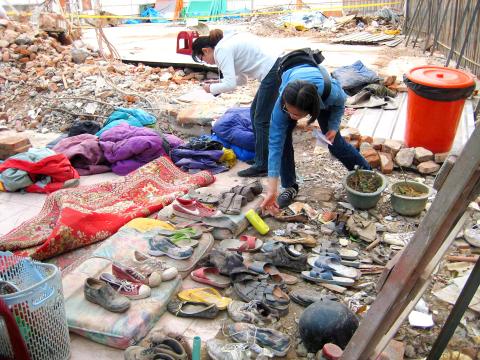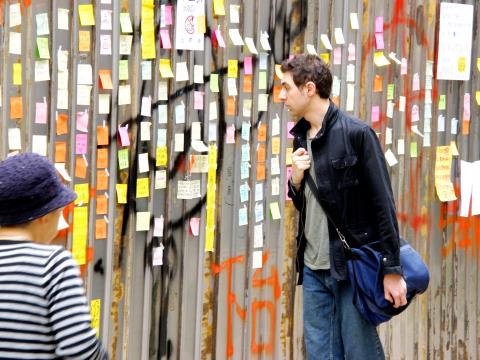Several student groups have mobilized following the demolition last week of the Wang (王) family residences for an urban renewal project in Taipei, camping out on the site and calling for a stop to all construction work, amendments to the Urban Renewal Act (都市更新條例) and the rebuilding of the Wangs’ homes.
The Wangs lived in two houses on a plot of land in Shilin District (士林) that a construction firm was eyeing for a 15-story apartment. Although the Wangs had refused to sell their properties, the construction firm, having obtained the consent of 95 percent of the landowners on the block, asked the city government to evict the family.
Students have set up tents and a makeshift station at the site of the Wangs’ former residence, with posters and slogans such as “Buy a house at 40 and see it demolished at 70” lining the makeshift walls.

Photo: Huang Chi-hao, Taipei Times
Although the construction site has been walled off, an opening remains, giving protesters and the Wang family access to the worksite.
Liu Hsiao-hsin (劉曉欣), a fine arts student from National Taiwan Normal University who has slept at the site for eight days, said it was shocking to see the government use its administrative power to demolish a residence that would take most people a lifetime to buy.
“A lot of people came out and supported our actions, but they couldn’t stay because they have jobs and have to support their families,” said Liu, who had also participated in recent rallies in support of the rights of workers, farmers and minority groups.

Photo: Yao Yueh-hung, Taipei Times
A professor from the sociology department at an unnamed university said that any student who came out in support of the Wangs would get an extra 90 points on their mid-terms, which were held on Friday, two days after the demolition.
“I hope that other students who came to support the Wangs receive as much support from their professors,” Liu said, adding that “justice and equality are what I believe in and I will continue to fight for them.”
Liu said that prior to the demolition, she and other supporters had slept on the floor of the Wangs’ house, but they have since relocated and were now sleeping beneath the MRT line.
Hsien Yi-ting (謝邑霆), a law student from National Taipei University, said although he was studying law, he learned through the Wang incident that “administering by the law” is not always correct.
If the law goes against the Constitution, the power which that law confers should be annulled, Hsieh said.
An architecture student surnamed Shen (沈) from National Cheng Kung University in Greater Tainan said he had packed his bags and headed north after seeing protesting students evicted from the Wang house by police on TV.
“Being here and supporting the Wangs is more important than staying in school and going to classes,” Shen said.
Yang Yu-ting (楊語停), a self-proclaimed xiangmin, or “Internet forum poster,” said that on Thursday, the day of the demolition, the sight of police officers wielding batons and shields and treating students like captives from the enemy camp was worse than what he thought the Chinese Communist Party would do.
Yang said she had traveled to Taipei four times from Hsinchu to film the incident and post it online so that more netizens would see “what a horrible thing” the Taipei City Government had done to the Wang family.
Yao Kuai (妖怪), a second-year high-school student, not only spray-painted the excavators while they were being moved into position, but also sang a self-composed song titled Caretakers of the People, mocking the police for picking on people and accusing the government of corruption.
Professors from National Chengchi University (NCCU), Shih Hsin University, National Taiwan University of Arts, Taipei National University of the Arts, Soochow University and Tunghai University have also appeared at the Wang family site to express their thoughts.
Some have even relocated classes to the site “so that students could debate” the issue.
Students from National Tamkang University, Fu Jen Catholic University, National Taiwan University and NCCU have also mobilized to support the Wangs.
Human rights lawyer Chiu Huang-chuan (邱晃泉), who had visited the site, said protesters were not affiliated with any political party or corporate interests.
A 61 year-old participant named Lee Chun-chung (李俊崇) said that “autocratic governments fear student activities the most, because they are the one group that has no interests, and is the hardest to defame.”
Translated by Jake Chung, Staff writer

SECURITY: As China is ‘reshaping’ Hong Kong’s population, Taiwan must raise the eligibility threshold for applications from Hong Kongers, Chiu Chui-cheng said When Hong Kong and Macau citizens apply for residency in Taiwan, it would be under a new category that includes a “national security observation period,” Mainland Affairs Council (MAC) Minister Chiu Chui-cheng (邱垂正) said yesterday. President William Lai (賴清德) on March 13 announced 17 strategies to counter China’s aggression toward Taiwan, including incorporating national security considerations into the review process for residency applications from Hong Kong and Macau citizens. The situation in Hong Kong is constantly changing, Chiu said to media yesterday on the sidelines of the Taipei Technology Run hosted by the Taipei Neihu Technology Park Development Association. With

CARROT AND STICK: While unrelenting in its military threats, China attracted nearly 40,000 Taiwanese to over 400 business events last year Nearly 40,000 Taiwanese last year joined industry events in China, such as conferences and trade fairs, supported by the Chinese government, a study showed yesterday, as Beijing ramps up a charm offensive toward Taipei alongside military pressure. China has long taken a carrot-and-stick approach to Taiwan, threatening it with the prospect of military action while reaching out to those it believes are amenable to Beijing’s point of view. Taiwanese security officials are wary of what they see as Beijing’s influence campaigns to sway public opinion after Taipei and Beijing gradually resumed travel links halted by the COVID-19 pandemic, but the scale of

A US Marine Corps regiment equipped with Naval Strike Missiles (NSM) is set to participate in the upcoming Balikatan 25 exercise in the Luzon Strait, marking the system’s first-ever deployment in the Philippines. US and Philippine officials have separately confirmed that the Navy Marine Expeditionary Ship Interdiction System (NMESIS) — the mobile launch platform for the Naval Strike Missile — would take part in the joint exercise. The missiles are being deployed to “a strategic first island chain chokepoint” in the waters between Taiwan proper and the Philippines, US-based Naval News reported. “The Luzon Strait and Bashi Channel represent a critical access

Pope Francis is be laid to rest on Saturday after lying in state for three days in St Peter’s Basilica, where the faithful are expected to flock to pay their respects to history’s first Latin American pontiff. The cardinals met yesterday in the Vatican’s synod hall to chart the next steps before a conclave begins to choose Francis’ successor, as condolences poured in from around the world. According to current norms, the conclave must begin between May 5 and 10. The cardinals set the funeral for Saturday at 10am in St Peter’s Square, to be celebrated by the dean of the College